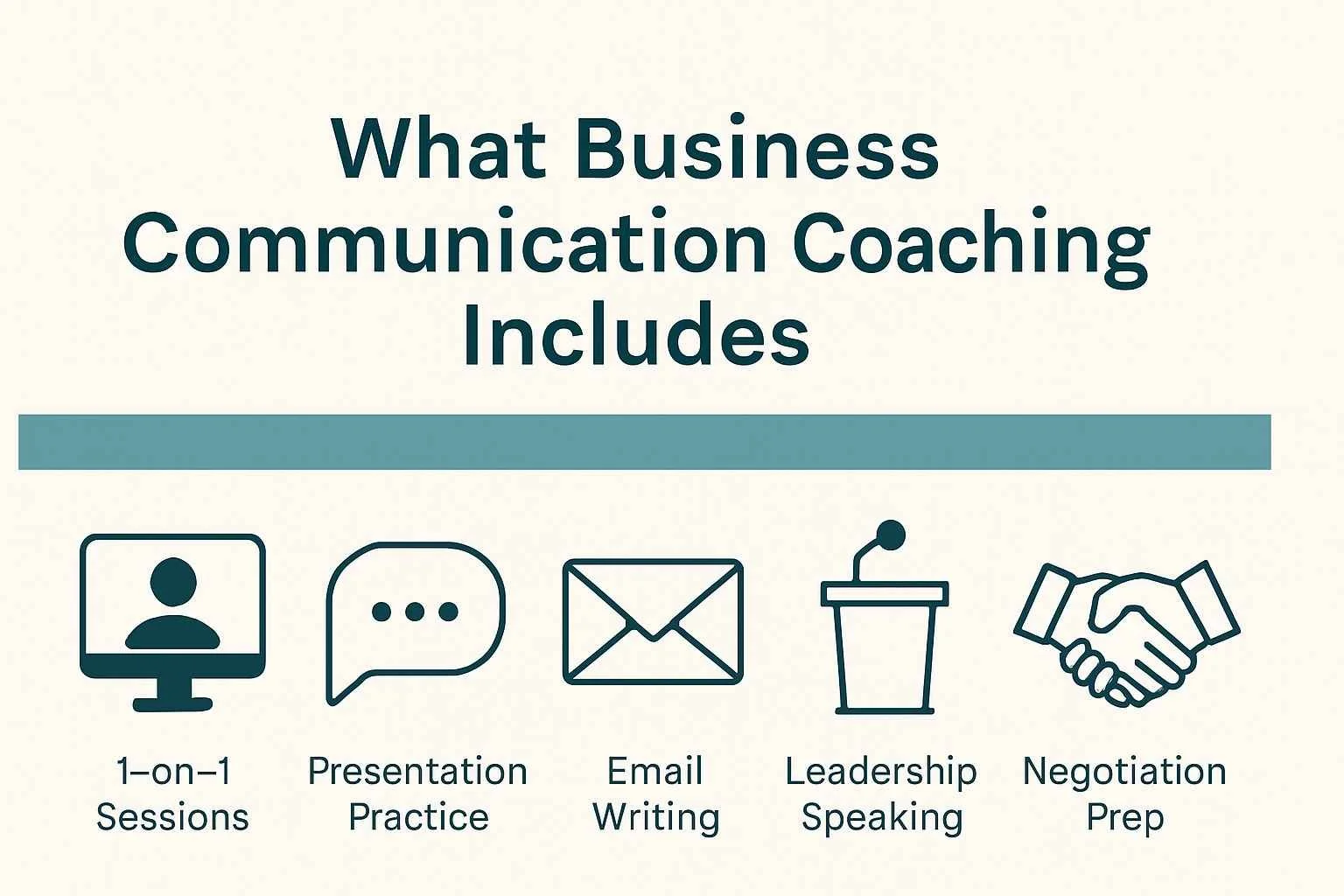Business Communication Skills Training for Professionals
Strong communication skills are a necessity in any workplace these days, especially as technology shapes how we lead meetings, write reports, or give presentations. Even experienced professionals can feel unable to manage public speaking, effective business writing, or difficult conversations without extra support.
That is where business communication training comes in. These programs are designed to help you build confidence, improve clarity, and communicate more effectively across different forms, from emails to team discussions. Many courses include case studies that show real workplace challenges and solutions.
You might want to advance your career, influence others as a leader, or feel more prepared in the workplace. The right training can change your outcomes and help you achieve your professional goals.
Key Takeaways:
Why Communication Matters: Strong business communication impacts job performance, leadership, teamwork, client relationships, and negotiation outcomes.
What Coaching Provides: Communication coaching helps improve clarity, confidence, and effectiveness in both spoken and written interactions. It sets learning objectives to make you a better communicator through a proven process.
Who It’s For: Anyone, from early-career professionals to executives, students, and those returning to work, can benefit from communication coaching.
Long-Term Value: With consistent support, communication becomes more natural, impactful, and aligned with your goals. Technology and human interaction blend for effective learning.
Why Business Communication Matters More Than Ever
Signs You Might Benefit from Communication Coaching
What Business Communication Coaching Includes
How Coaching Helps Build Confidence and Clarity
Frequently Asked Questions About Business Communication
How Connected Speech Pathology Can Help With Business Communication Skills Training
Why Business Communication Matters More Than Ever
Strong business and leadership communication is essential for success. As organizations become more varied and reliant on technology, your ability to communicate clearly can shape everything from daily job performance to long-term professional growth.
Good interpersonal communication helps teams work efficiently, strengthens leadership communications, and keeps departments aligned with organizational goals.
Still, many professionals face communication hurdles. Misunderstandings in meetings, anxiety about public speaking, or struggles with business writing can make you feel unable to express yourself. Poor communication can lead to delays, lost opportunities, or even conflict among colleagues or clients.
Case studies show these challenges are common, and there are solutions available. With the right tools and group or individual communication skills training, anyone can learn techniques to improve their communication skills. Just like any other professional skill, effective communication gets better through guidance, practice, and feedback on your outcomes.
Signs You Might Benefit from Communication Coaching
You do not have to be struggling to benefit from communication coaching. Many professionals enroll to improve outcomes, increase their influence, or feel more confident using technology and communication tools at work. Coaching offers support at a reasonable cost and is tailored for people from a wide range of backgrounds, reflecting the diversity of today's workplaces.
If any of the following sound familiar, communication coaching might be a smart next step:
You have difficulty speaking eloquently and explaining your ideas clearly during meetings or team discussions.
You feel nervous or anxious when speaking in front of others, especially during presentations.
You struggle with business writing, like crafting professional emails, reports, or proposals.
You have received feedback from coworkers or supervisors that your communication is unclear or hard to follow.
You often feel overlooked in your organization or passed over for leadership opportunities despite your skills.
As a promoted leader, you are interested in taking leadership communication training.
As a public-facing employee, you want to enhance your interpersonal communication skills.
Many students and professionals struggle to reach their full potential at work due to these common challenges. Communication coaching uses a proven process, often including case studies, technology tools, and real-time feedback, to help you verify your progress and reach your goal, regardless of your team's diversity or the cost considerations you face.
What Business Communication Coaching Includes
Business communication coaching addresses real workplace challenges with practical, personalized guidance. Coaching is available in different formats, each designed to fit your needs and comfort level.
Types of Coaching Formats
You can choose from several coaching styles:
One-on-One Coaching: Individual sessions give you direct feedback and focused practice. Your coach tailors each meeting to your communication goals, job demands, and personal style.
Group Coaching: Small group sessions encourage peer learning and provide space to practice real scenarios. You gain insights from others and improve teamwork and collaboration.
Online Coaching: Virtual sessions use video calls, interactive tools, and screen sharing. You receive live feedback, real-time practice, and engaging interaction, all from the comfort of your own space. This format fits busy schedules and remote work.
In-Person Coaching: Some people enjoy the energy of being in the same room with a coach. In-person sessions offer hands-on practice and immediate feedback, but most skills and experiences translate equally well online.
| Coaching Format | Setting | Key Features | Best For |
|---|---|---|---|
| One-on-One | Online/In-Person | Personalized feedback, targeted strategies, real-world application | Focused skill-building, career growth |
| Group | Online/In-Person | Peer practice, shared learning, teamwork development | Team improvement, collaborative environments |
| Online | Remote | Flexible access, live interaction, direct feedback, real-time practice | Professionals needing convenience and effective support |
| In-Person | Onsite/Office | Face-to-face presence, hands-on activities, in-room energy | Those who prefer physical presence and live settings |
What Coaching Sessions Cover
Each coaching style focuses on your daily challenges and career ambitions. Sessions include:
Practice for real-world scenarios: Presentations, meetings, interviews, negotiations, client conversations, and tough discussions.
Business writing and speaking skills: Help with professional emails, reports, proposals, and public speaking, using case studies for practical examples.
Personalized feedback: Suggestions that address your habits and highlight your strengths.
Practical strategies: Tools to organize your thoughts, manage nerves, and communicate clearly and confidently.
Some programs include verification of your progress. At the end of coaching, you may receive a summary of your outcomes and skills, so you can verify your completion and feel confident sharing your achievements.
How Each Format Supports You
One-on-One coaching offers personal attention and flexible pacing, supporting rapid growth in leadership, public speaking, or business writing.
Group coaching builds confidence in team settings, sharpens collaboration, and helps you practice with others.
Online programs provide the same level of feedback and real-time practice as in-person sessions, all through secure video. You save time and can learn wherever you are.
In-person individual courses appeal most to those who find motivation and comfort from being physically present with a coach.
With multiple options, you can pick the approach that matches your lifestyle and learning preferences.
How Coaching Helps Build Confidence and Clarity
One of the most significant benefits of business communication training is how it boosts both confidence and clarity.
You learn how to organize your thoughts, stay calm under pressure, and speak or write with greater impact. The more you practice real workplace scenarios, like giving presentations, leading meetings, or writing clear emails, the more natural it starts to feel.
Many professionals experience breakthroughs they didn’t think were possible. Some individuals become more concise and direct during team discussions, while others learn to communicate effectively in large group settings without second-guessing themselves.
Some even discover how to take the lead in conversations where they once stayed quiet. These shifts improve how others see you and help you feel more in control of how you present yourself.
Importantly, coaching isn’t about changing your personality or turning you into someone you’re not. It’s about helping your ideas, skills, and leadership qualities come through more effectively.
With the proper support, you can communicate in a way that feels authentic and powerful.
Executive Communication Coaching
Check out our blog on executive communication coaching for more information!
Frequently Asked Questions About Business Communication
1. What are effective communication skills for business?
Effective business communication skills include being able to express ideas clearly, listen actively, write professional emails or reports, and adjust your tone depending on the audience.
They also involve giving and receiving feedback, leading productive meetings, and handling difficult conversations with confidence and respect.
2. What are the basic business skills?
Basic business skills cover a range of areas, including communication, problem-solving, time management, teamwork, and understanding core concepts like budgeting and project planning.
Strong communication skills are essential because they support nearly every other part of your professional role, from working with a team to managing clients or leading others.
3. What is the hardest thing to learn in business?
For many people, one of the hardest things to learn is how to communicate clearly and confidently in all situations. Whether it’s giving an effective presentation, negotiating a deal, or writing a difficult email, finding the right words under pressure can be challenging.
The good news is that with the proper training and support, these skills can be learned and improved over time.
4. Do I need a business communication certificate to benefit from coaching?
You do not need a business communication certificate to benefit from coaching. Certificates are typically offered by colleges or training programs to show that you have completed a specific curriculum.
Our coaching gives you flexible, targeted support for your professional goals, without requiring enrollment in a formal certificate program. If you need proof of participation, we can provide a letter confirming your coaching sessions upon request.
How Connected Speech Pathology Can Help With Business Communication Skills Training
Connected Speech Pathology provides personalized, one-on-one business and leadership communication training to help professionals speak and write with greater confidence and clarity. Our expert coaches tailor every session to your specific goals and workplace needs, whether you are preparing for a presentation, leading meetings, negotiating, or improving your writing.
All services are delivered remotely, making it easy to work with your coach from anywhere. Through secure virtual sessions, we offer flexible scheduling, practical strategies, and direct feedback you can apply immediately. Our process emphasizes human connection, effective use of technology, and strategies that fit seamlessly into your professional life.
With years of experience and proven results, Connected Speech Pathology has helped professionals in diverse industries communicate with impact. Clients consistently report increased confidence, stronger communication skills, and greater success in their careers.
Summary
Strong communication isn’t something you’re either born with or without; it’s a skill you can develop with the proper support and practice. Maybe you are working toward a promotion, preparing for presentations, or simply trying to feel more confident at work. Communication coaching can be a game-changer.
About the Author
Allison Geller is a communication coach, speech-language pathologist, and founder of Connected Speech Pathology, an international online practice providing professional communication coaching and speech therapy for children, teens, and adults. With more than two decades of experience, she has worked in medical and educational settings, published research on aphasia, and leads a team of specialists helping clients improve skills in public speaking, vocal presence, accent clarity, articulation, language, fluency, and interpersonal communication.








